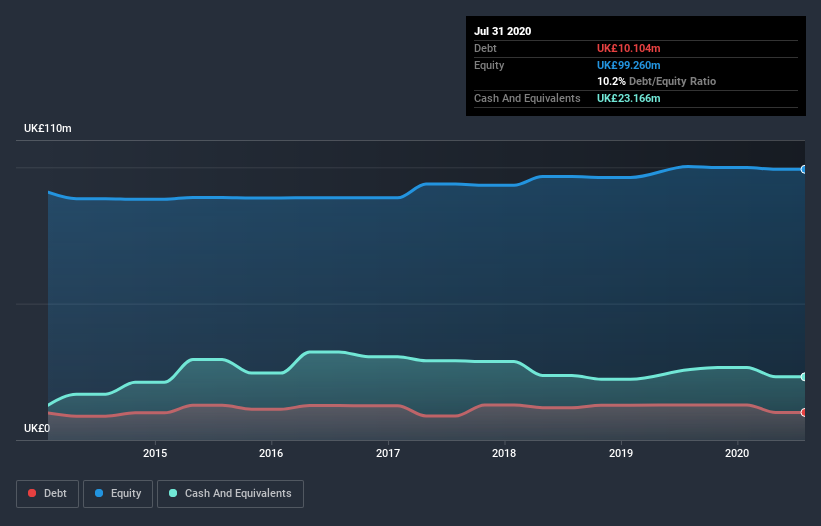
Legendary fund manager Li Lu (who Charlie Munger backed) once said, 'The biggest investment risk is not the volatility of prices, but whether you will suffer a permanent loss of capital.' When we think about how risky a company is, we always like to look at its use of debt, since debt overload can lead to ruin. As with many other companies J. Smart & Co. (Contractors) PLC (LON:SMJ) makes use of debt. But the more important question is: how much risk is that debt creating?
What Risk Does Debt Bring?
Debt assists a business until the business has trouble paying it off, either with new capital or with free cash flow. Part and parcel of capitalism is the process of 'creative destruction' where failed businesses are mercilessly liquidated by their bankers. However, a more common (but still painful) scenario is that it has to raise new equity capital at a low price, thus permanently diluting shareholders. Of course, plenty of companies use debt to fund growth, without any negative consequences. When we think about a company's use of debt, we first look at cash and debt together.
Check out our latest analysis for J. Smart (Contractors)
What Is J. Smart (Contractors)'s Net Debt?
The image below, which you can click on for greater detail, shows that J. Smart (Contractors) had debt of UK£10.1m at the end of July 2020, a reduction from UK£12.9m over a year. But it also has UK£23.2m in cash to offset that, meaning it has UK£13.1m net cash.

How Healthy Is J. Smart (Contractors)'s Balance Sheet?
The latest balance sheet data shows that J. Smart (Contractors) had liabilities of UK£13.2m due within a year, and liabilities of UK£2.55m falling due after that. Offsetting these obligations, it had cash of UK£23.2m as well as receivables valued at UK£3.19m due within 12 months. So it actually has UK£10.6m more liquid assets than total liabilities.
This surplus suggests that J. Smart (Contractors) is using debt in a way that is appears to be both safe and conservative. Given it has easily adequate short term liquidity, we don't think it will have any issues with its lenders. Simply put, the fact that J. Smart (Contractors) has more cash than debt is arguably a good indication that it can manage its debt safely.
It is just as well that J. Smart (Contractors)'s load is not too heavy, because its EBIT was down 60% over the last year. When it comes to paying off debt, falling earnings are no more useful than sugary sodas are for your health. The balance sheet is clearly the area to focus on when you are analysing debt. But you can't view debt in total isolation; since J. Smart (Contractors) will need earnings to service that debt. So if you're keen to discover more about its earnings, it might be worth checking out this graph of its long term earnings trend.
Finally, while the tax-man may adore accounting profits, lenders only accept cold hard cash. J. Smart (Contractors) may have net cash on the balance sheet, but it is still interesting to look at how well the business converts its earnings before interest and tax (EBIT) to free cash flow, because that will influence both its need for, and its capacity to manage debt. In the last three years, J. Smart (Contractors)'s free cash flow amounted to 47% of its EBIT, less than we'd expect. That's not great, when it comes to paying down debt.
Summing up
While we empathize with investors who find debt concerning, you should keep in mind that J. Smart (Contractors) has net cash of UK£13.1m, as well as more liquid assets than liabilities. So we are not troubled with J. Smart (Contractors)'s debt use. There's no doubt that we learn most about debt from the balance sheet. However, not all investment risk resides within the balance sheet - far from it. Consider risks, for instance. Every company has them, and we've spotted 3 warning signs for J. Smart (Contractors) you should know about.
When all is said and done, sometimes its easier to focus on companies that don't even need debt. Readers can access a list of growth stocks with zero net debt 100% free, right now.
If you decide to trade J. Smart (Contractors), use the lowest-cost* platform that is rated #1 Overall by Barron’s, Interactive Brokers. Trade stocks, options, futures, forex, bonds and funds on 135 markets, all from a single integrated account. Promoted
New: Manage All Your Stock Portfolios in One Place
We've created the ultimate portfolio companion for stock investors, and it's free.
• Connect an unlimited number of Portfolios and see your total in one currency
• Be alerted to new Warning Signs or Risks via email or mobile
• Track the Fair Value of your stocks
This article by Simply Wall St is general in nature. It does not constitute a recommendation to buy or sell any stock, and does not take account of your objectives, or your financial situation. We aim to bring you long-term focused analysis driven by fundamental data. Note that our analysis may not factor in the latest price-sensitive company announcements or qualitative material. Simply Wall St has no position in any stocks mentioned.
*Interactive Brokers Rated Lowest Cost Broker by StockBrokers.com Annual Online Review 2020
Have feedback on this article? Concerned about the content? Get in touch with us directly. Alternatively, email editorial-team (at) simplywallst.com.
About LSE:SMJ
J. Smart (Contractors)
Engages in the contracting, developing, and constructing public works, shopping centers, offices, factories, warehouses, local authority, and landlords and private housing projects in the United Kingdom.
Excellent balance sheet average dividend payer.
Market Insights
Community Narratives



